Search
for
Sort by
Research
30 / 1000+ results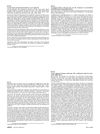
research Pulsed Dye Laser Treatment of Jessner Lymphocytic Infiltration of the Skin
Pulsed dye laser treatment was effective for a skin condition resistant to other treatments.
research Alopecia Areata with Lymphocytic Mural Folliculitis Affecting the Isthmus in a Thoroughbred Mare
The horse had a rare type of hair loss caused by immune cells attacking hair follicles.
research Lymphocytic Mural Folliculitis Resembling Epitheliotropic Lymphoma in Tigers (Panthera Tigris)
Tigers had a skin condition causing hair loss and inflammation, but the cause is unknown and treatment didn't work.

research Alopecia Areata: A Tissue-Specific Autoimmune Disease of the Hair Follicle
Alopecia areata is an autoimmune condition causing hair loss due to the immune system attacking hair follicles, often influenced by genetics and stress.

research Alopecia Areata: A Multifactorial Autoimmune Condition
Alopecia areata is an autoimmune disease causing patchy hair loss, often with other autoimmune disorders, but its exact causes are unknown.

research Fibrosing Alopecia in a Pattern Distribution
Fibrosing alopecia in a pattern distribution is a unique hair loss condition that may respond to antiandrogen therapy.
research Beard Involvement in a Man with Frontal Fibrosing Alopecia
Frontal fibrosing alopecia can affect men's beards and leads to permanent hair loss.
research Nivolumab-Induced Alopecia Areata: A Case Report and Literature Review
Nivolumab can cause hair loss as a rare side effect.

research Clinical Characteristics, Trichoscopy, Histopathology, and Treatment Outcomes of Frontal Fibrosing Alopecia in an Asian Population: A Retro-Prospective Cohort Study
Asian patients with Frontal Fibrosing Alopecia often lose eyebrow hair and respond well to combined antiandrogen or antimalarial and topical treatments.
research Follicular Mycosis Fungoides: Variability of a Rare Entity
FMF and mycosis fungoides are variants of the same disease, and bexarotene can be an effective treatment.

research Diagnostic Exercise: Severe Bilaterally Symmetrical Alopecia in a Horse
A horse with severe hair loss was diagnosed with alopecia areata and a yeast infection.
research Fox-Fordyce Disease: A Case Study of a 42-Year-Old Woman
The patient had a severe itchy rash and hair loss in the armpits.
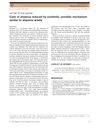
research Case of Alopecia Induced by Sorafenib, Possible Mechanism Similar to Alopecia Areata
Sorafenib may cause hair loss in a way similar to alopecia areata.

research Clinical and Histopathological Features of Itch in Patients with Alopecia Areata
Some patients with Alopecia Areata experience itch due to immune cells and enzymes that cause itching.

research Werewolf, There Wolf: Variants in Hairless Associated with Hypotrichia and Roaning in the Lykoi Cat Breed
The unique coat of lykoi cats is likely caused by new variants in the Hairless gene.
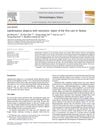
research Lipedematous Alopecia with Mucinosis: Report of the First Case in Taiwan
Taiwan reported its first case of a rare scalp condition with no clear cause or treatment.

research Human Regulatory Gamma Delta T Lymphocytes as Novel Autoimmunity-Protective Cells: Lessons from Alopecia Areata
γδTregs may help treat autoimmune diseases like alopecia areata by promoting hair regrowth and reducing immune attacks.

research Propylthiouracil-Induced Alopecia Accompanying Hypohidrosis and Onychomadesis
Propylthiouracil can cause hair loss, reduced sweating, and nail issues, but stopping the drug can reverse hair and nail problems.
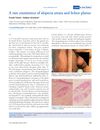
research A Rare Coexistence of Alopecia Areata and Lichen Planus
A man had both alopecia areata and lichen planus, which is uncommon.
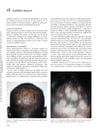
research Syphilitic Alopecia: A Rare Manifestation of Secondary Syphilis
Syphilitic alopecia is a rare hair loss condition in secondary syphilis that looks similar to another condition but can be diagnosed with specific tests and responds to antibiotics.

research Early Stage Alopecia Areata Is Associated With Inflammation in the Upper Dermis and Damage to the Hair Follicle Infundibulum
Early stage bald spots are linked to skin inflammation and damage to the upper part of the hair follicle.

research Immune Response Involving the Bulge Region in Addition to Telogen Conversion Contributes to Hair Loss in a Case of Atypical Drug-Induced Hypersensitivity Syndrome
Hair loss in a drug reaction case involved both a common shedding phase and an immune attack on hair follicle stem cells.

research A New Subtype of Lichen Planopilaris Affecting Vellus Hairs and Clinically Mimicking Androgenetic Alopecia
New LPP subtype affects vellus hairs, mimics AGA, and needs biopsy for diagnosis.
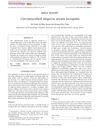
research Circumscribed Alopecia Areata Incognita
A rare form of alopecia causes hair thinning without bald spots and may be more common than thought, responding well to steroid treatment.

research Concomitant Presentation of Alopecia Areata in Siblings: A Rare Occurrence
Two siblings both had a rare case of alopecia areata at the same time.

research Androgenetic Alopecia: An Attempt to Target Microinflammation
Reducing micro-inflammation didn't change hair growth patterns in AGA.

research Alopecia Universalis After Discontinuation of Pegylated Interferon and Ribavirin Combination Therapy for Hepatitis C: A Case Report
A man lost all his hair after stopping hepatitis C treatment and it didn't grow back.
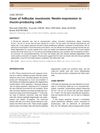
research Case of Follicular Mucinosis: Nestin-Expression in Mucin-Producing Cells
A 29-year-old man had a jaw plaque diagnosed as follicular mucinosis, linked to nestin-positive hair follicle stem cells.
research Immunohistochemical Analysis of T-Cell Subsets in the Inflammatory Infiltrates of Alopecia Areata and Its Comparison with Androgenetic Alopecia
T-cell patterns in skin help distinguish alopecia areata from androgenetic alopecia.